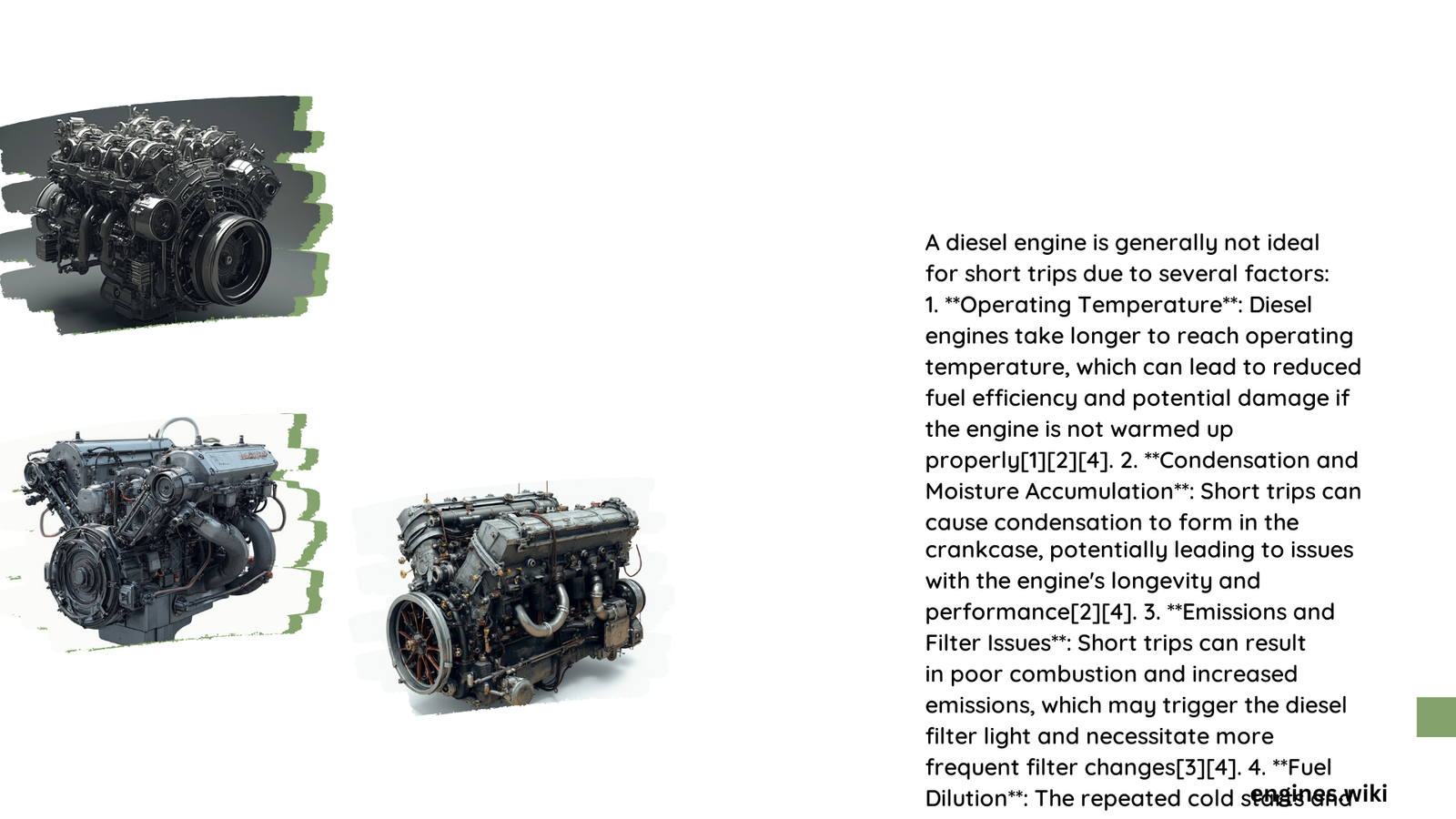Diesel engines are generally not recommended for short trips due to their design and operational characteristics. These engines are built for long-distance driving and perform optimally when allowed to reach and maintain their operating temperature. Short trips prevent diesel engines from achieving their peak efficiency, leading to increased fuel consumption, higher emissions, and potential long-term damage to engine components. This article explores the challenges and considerations of using diesel engines for short trips, providing insights into fuel efficiency, maintenance requirements, and overall performance in urban driving scenarios.
What Are the Fuel Efficiency Implications of Short Trips for Diesel Engines?
Diesel engines face significant fuel efficiency challenges when used primarily for short trips:
-
Increased Fuel Consumption: Diesel engines require more time to warm up compared to gasoline engines. On short trips, they often don’t reach optimal operating temperature, resulting in higher fuel consumption.
-
Urban vs. Highway Efficiency: The fuel economy of diesel engines can vary dramatically between urban and highway driving. For example:
- Highway driving: 55-61 mpg
-
Urban, stop-and-go traffic: 38-45 mpg
-
Cold Start Inefficiency: During cold starts, diesel engines consume more fuel and produce higher emissions until they reach their optimal operating temperature.
-
Incomplete Combustion: Short trips may lead to incomplete fuel combustion, potentially causing carbon buildup in the engine and reducing overall efficiency.
How Do Short Trips Affect Diesel Engine Maintenance Requirements?

Frequent short trips can significantly increase maintenance needs for diesel engines:
- Oil Changes: More frequent oil changes are necessary due to:
- Increased condensation in the oil
- Faster oil degradation from repeated cold starts
-
Potential fuel dilution in the oil
-
Diesel Particulate Filter (DPF) Issues:
- DPF may not reach temperatures required for regeneration
- More frequent cleaning or replacement may be needed
-
Increased risk of DPF clogging
-
Battery Strain:
- Short trips may not allow sufficient battery recharging
- Increased load on the starter battery
-
Potential for shorter battery lifespan
-
EGR System Maintenance:
- Exhaust Gas Recirculation (EGR) valve may clog more quickly
- More frequent cleaning or replacement of EGR components
| Maintenance Item | Impact of Short Trips |
|---|---|
| Oil Changes | More frequent |
| DPF Maintenance | Increased cleaning/replacement |
| Battery Care | Higher strain, shorter lifespan |
| EGR System | More frequent servicing |
What Are the Performance Challenges of Diesel Engines in Urban Driving?
Diesel engines face several performance challenges in urban driving scenarios:
- Torque Output:
- Diesel engines excel in torque production
- Urban driving doesn’t allow engines to operate in their most efficient torque range
-
Stop-and-go traffic prevents optimal torque utilization
-
Acceleration:
- Slower acceleration from cold starts compared to gasoline engines
-
Can be a disadvantage in urban environments requiring frequent acceleration
-
Stop-and-Go Inefficiency:
- Diesel engines are less efficient in stop-and-go traffic
- Longer warm-up times lead to increased fuel consumption
- Higher wear on engine components in urban driving conditions
How Does Short-Trip Driving Impact Diesel Engine Longevity?
Frequent short trips can have a significant impact on the longevity of diesel engines:
- Reduced Engine Lifespan:
- Increased wear on mechanical parts
- Higher fuel dilution in engine oil
-
Moisture accumulation in the engine
-
Component Wear:
- Accelerated wear on piston rings and other moving parts
-
Increased stress on engine during cold start phases
-
Recommended Practices for Longevity:
- Take regular longer trips (70-100 miles non-stop)
- Use premium quality fuel
- Maintain shorter oil change intervals
What Are the Environmental Considerations of Short-Trip Diesel Engine Use?
Short-trip diesel engine use has several environmental implications:
- Increased Emissions:
- Higher levels of pollutants during cold starts
-
Incomplete combustion leading to increased particulate matter
-
DPF Regeneration Issues:
- Insufficient temperature for proper DPF regeneration
-
Potential for increased particulate emissions
-
AdBlue System Inefficiency:
- SCR systems may not reach optimal operating temperature
- Reduced effectiveness in NOx reduction
Are There Any Advantages to Using Diesel Engines for Short Trips?
While diesel engines are generally not ideal for short trips, there are a few potential advantages:
-
Fuel Cost: Diesel fuel can be cheaper than gasoline in some regions, potentially offsetting higher consumption.
-
Torque for Load Carrying: If short trips involve carrying heavy loads, diesel’s high torque can be beneficial.
-
Durability: Despite increased wear, diesel engines are generally built to last longer than gasoline engines.
What Alternatives Should Be Considered for Short-Trip Driving?
For those primarily engaged in short-trip driving, consider these alternatives:
- Gasoline Engines:
- Faster warm-up times
-
Better suited for urban, stop-and-go driving
-
Hybrid Vehicles:
- Excellent for short trips and urban driving
-
Combine benefits of electric and gasoline engines
-
Electric Vehicles:
- Ideal for short trips and urban environments
-
Zero emissions and lower operating costs
-
Plug-in Hybrids:
- Can operate on electric power for short trips
- Gasoline engine available for longer journeys
In conclusion, while diesel engines offer advantages in certain scenarios, they are generally not the best choice for those primarily making short trips. The increased maintenance requirements, reduced fuel efficiency, and potential for long-term engine damage make other options more suitable for urban and short-distance driving. Consider your driving habits and needs carefully when choosing between diesel and alternative engine types.
References:
1. MyCarly Blog
2. Singletrack World Forum
3. BobIsTheOilGuy Forum
